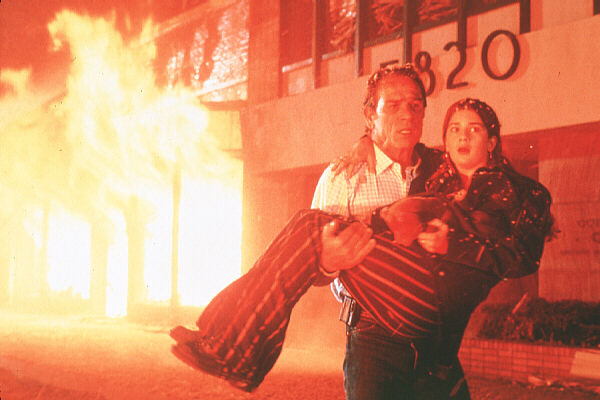

The Future of Food is the documentary equivalent to a Tommy Lee Jones disaster movie. Whereas the former is more of a “what the heck” experience, the latter is definitely an “oh shit” phenomenon. The difference is that in something like Volcano there is Tommy Lee Jones to save the day, and as a spectator there is actually nothing you can do to stop the volcano. This is not the case with The Future of Food. It is a film about large corporations genetically altering seeds and patenting them, thus privatizing the world’s food source. Sadly, when Tommy is really needed, he’s nowhere to be seen. Even Nicolas Cage is AWOL; most likely, he’s gawking at some other horrible catastrophe.
Unlike its fictional brethren, The Future of Food would like to have its audience believe that they can make a difference in the story on screen. The closing montage suggests such an illusion. A young boy bites into a lush, red, organic strawberry (the same iconography as the “evil-ones” use) and as he pulls it away - a pure, natural libation - the frame freezes. The audience is told that the choice is up to us. Cut to a shot of a dandelion, whose seeds are blowing away, reminding the audience both that natural foods are a fragile, impermanent existence, but also that they have to power to “blow” the corporations away.
This is manipulative, because if you pay attention to the entire film, emphasized over and over again is how incessant this gene research is. It is such a one-sided film, with the organic revolution represented by farmers and liberal intellectuals, and the genetic researchers represented by large tractors (that appear to be mowing down fields rather than cultivating them), men in biohazard suits, planes spreading pesticides, and the solitary title-card that reveals only a limited list of the benefits that genetic research has accomplished. The imagery falls into the classical propaganda category perfectly. For a moment, just consider how Eisenstein contrasted the chaotic, confused – emotional – civilians fleeing the mechanical, ordered – unemotional – soldiers attacking on the Odessa Steps. Man vs. Machine, with the future of humanity placed in so assuredly in man. Even Fritz Lang was worldly enough to place the blame not on technology, but in mankind’s use of it (all of his post-Metropolis films emphasize this by pitting the solitary man against the group).
But I’ve gotten away from the other point of comparing The Future of Food to a disaster movie: it is a disaster movie. Like another of its brethren, Michael Moore’s Fahrenheit 9/11, Food carries the double duty of informing the public, as well as trying to have an immediate effect. Moore’s was to influence the U.S. 2004 vote against George W. Bush; Food's is to continue the support of farmers markets, which has been on the increase for nearly a decade, as well as the on-going consumer protests against the genetic alteration of seeds, which is turning into an Orwell-esque monopoly that has the support and financing of the big “G”: government. It is this feud, between the Capra-esque “little guy” and the oppressive, Republican government that forms the emotional core of the film. And it is emotional, vehemently so. Filmmaker Deborah Koons Garcia is convinced of her film’s position, and throws at the screen every piece of evidence to help win over believers, be it the stories of farmers dogged by corporations (sued out of their retirement fund) or percentile facts – or even the simple truth that the entire EU avoids all this drama by labeling genetically altered foods. In the process, Garcia seem to forget about “the other side” to every argument; thus, the film feels more like a religious gathering than a pro-organic convention. And perhaps there is actually something to be said for that.

No comments:
Post a Comment